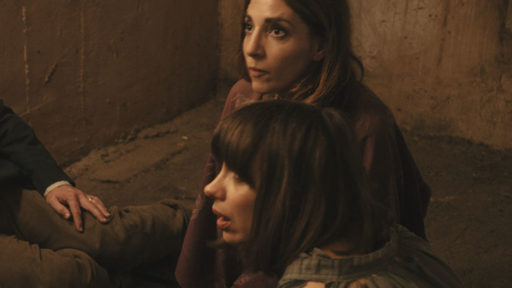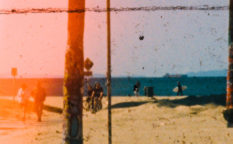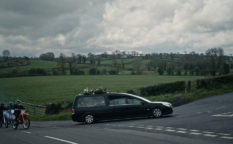Brexit: Keeping calm and carrying on at PÖFF Shorts
Saying I am not a fan of Brexit is a bit like saying that turkeys are not huge fans of Christmas. As a British citizen who lives in the EU I engage in some enlightened self-interest around the issue, not to mention my personal feelings at the entire omnishambles of a referendum and subsequent political disasters in which the worst excesses of British colonial and island mentality came to the fore, in my role as the Head of Live Action at PÖFF Shorts, I decided to present a programme of Brexit shorts entitled ‘Keeping Calm and Carrying On’, an echo of the wartime slogan that has been codified into a merchandisable statement of lifestyle choice.

Aside from reflecting a hot political issue of the time, the programme was also an exercise in personal therapy, an attempt for me to at least explore some of the issues that have left me angry, confused and estranged from the country that I was born in and was my home for three decades. The British don’t really do ‘angry’ cinema. At least not in the way of such films as Spike Lee’s Do The Right Thing or even Ladj Ly’s recent Les Miserables – urgent, firebrand condemnations of broken societies. This is not to say that the likes of Leigh and Loach, perhaps the UK’s most recognisable political filmmakers, aren’t angry. But there’s always a sense of world weariness, a cynicism that seems uniquely British. We don’t want to set the world on fire – but we will mutter under our breaths until someone does something about it. So I shouldn’t have been surprised when the majority of the films that ended up dealing with the issue of Brexit and identity weren’t angry political screeds.
Instead the majority of the films were dark comedies replete with gallows humour. Us Brits don’t scream into the abyss. We make wry and sarcastic comments at it. Jörg Tittel and Alex Helfrecht’s NYET! – a Brexit UK Border Farce , Freddy Syborn’s Capital and Stacey Williams’ Fingers Crossed all head down an absurdist and satirical route. NYET is a broad comedy in which two ‘Russian’ smugglers are discovered laden with contraband. The film delights in subverting expectations, playing with not only audience perception but also audience prejudice when the smugglers identities – and the true nature of the illegal items that they’re carrying – become apparent. The film’s final line of “We’ll always have cheddar,” – delivered by no less than stalwart British actress Olivia Williams – is maybe comedic but is also an ironic reminder of a English mentality in which totems of English identity are treated as some sort of way of managing to keep the evolution of society and culture at bay.
The same goes for Fingers Crossed in which a middle class couple host a dinner party despite being in a future England ravaged by devastation. Choosing the wine whilst riding a bike to keep the electricity going, or chatting about banalities whilst air-raid sirens blare outside seems to encapsulate the English mentality in a nutshell. Even its title is a sly skewering of a society convinced that ‘..everything will turn out all right’ no matter what is happening. In some ways these aspects to English identity are laudable – a cheerful refusal to let anything get us down. But there’s also the tang of arrogance, the feeling that we don’t need to worry because we’re English – and better than everyone else. Capital is perhaps the broadest comedy on offer in the programme, set in an UK in which 50.9 percent of the population had voted for the return of capital punishment. It offers a satirical view of British society through the new government department brought in to facilitate the change. There’s a wishy-washy liberal determined to do her job despite her objection to capital punishment or the ultra right wing project manager whose arguments end up into rants about immigrants. It may lack subtlety but the patent absurdity at the heart of film gives it a energy buoyed by dark humour.
Veering far away from comedy is Peter King’s This Is The Winter, perhaps the most directly polemical of all the films in the programme. Set in a future UK where the North and South of the country has become divided, it follows the fortunes of a young girl who must decide whether to stay with her father or join a group dedicated to the liberation of the North. While ostensibly not about Brexit – the film is as much a view on radicalisation and an examination of the lengths people to go to when their beliefs are tested – it’s still a bitter look at an England riven by division and violence.
The final two films in the programme are perhaps the most measured of all the works. Will Webb’s Citizen of Nowhere is a quiet affair about a girl who applies for French citizenship the day of the Brexit vote. The film follows her as she nervously waits for an answer. Reflecting the uncertainty many felt in the days after the vote, the film brings more of an outsider view to the situation. An outsider’s point of view is also in Conte Anglais, Daniel Marc Janes film about a French journalism student who heads to the coast of England to try and find the reason as to why people voted for Brexit. This is a homage to the films of Eric Rohmer (perhaps a massive irony in a programme of films about a country that wants to create more of a distance from its neighbours) and reflects on those who are actually affected – no matter their vote. Here the English mentality is portrayed as snobby and brusque. But there’s also a quiet romanticism and spirit of adventure that undercuts the spikier edges of English identity. All these films were screened before the long protracted process of Brexit was actually completed, but with many of them being set in a decaying future, there seemed a certain inevitability about it all, despite the hopes of something better. Yet, like an abused partner going back to their significant other simply because there doesn’t seem to be any other option, the UK were beaten into submission and went for the Brexit option.
Will the UK fall apart? Will we Brits living abroad be hounded back home? Will their be a vein of truly angry and vitriolic UK cinema? We don’t know. In the meantime I, and many others, will be keeping calm and carrying on
















